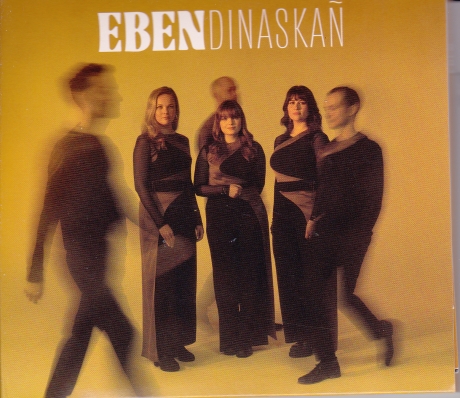

EBEN
Dinaskañ
Philippe Cousin
Jonathan Dour is a well-known and respected violinist in Brittany who has been involved in numerous projects and groups for over twenty-five years. In 2018, he launched the Eben project, a group created on the initiative of the Festival Interceltique de Lorient.
Originally, it was a meeting between young artists and an experienced musician so that the new generation could benefit from the experience of their elders in the field of creation and performance. A year later, the creation had evolved into a band in its own right, and Eben released its first eponymous album. Eben means “the Other” in Breton, someone who comes from elsewhere and brings a fresh perspective. Alongside Jonathan on the viola, there are two musicians from the Breton scene, Julien Stévenin on double bass and Antoine Lahay on guitar. And then there are three kan ha diskan singers, Sterenn Diridollou, Marine Lavigne, and Sterenn Le Guillou, who have been singing together since their middle school years at Diwan. They represented France at Eurovision in 2022 with Alvan.
After a debut album in 2019 and more than six years touring Brittany and Europe with a repertoire of dance music, they now offer us a second album, Dinaskañ (meaning “to unshackle” or “to liberate” in Breton). The word sounds a bit like kan ha diskan, a form of Breton singing practiced by the three singers.
More than just an album, Dinaskañ is an artistic manifesto whose tracks, mostly written by M. Lavigne and S. Le Guillou, are a call for emancipation and resistance. Through dance, encounters, travel, women's rights (Eostig Kuzh, Fulennig, Hillig ur pok) and the freedom to express oneself in one's own language. And then there is a subject that is very much in tune with the times: the struggle against all forms of oppression and fascism (Dañs ar Bleiz - The wolf dance).
There are also two traditional songs, Nevez Amzer and Anjela Duval's poem, Dinaskañ. All the lyrics are written in Breton, the everyday language of the singers, who love to play with its rich and colorful words and expressions.
Although traditional music, kan ha diskan and gwerzioù (ballads) are the band's main source of inspiration, the members of Eben know how to break free from tradition, drawing on various other genres such as jazz, folk and pop to create contemporary Breton music. Breton-Indian tabla player Ilyas Khan joins the band to enhance the sextet's rhythms and melodies.
Their music is inspired by Breton tradition while moving away from a backward-looking vision of it. Purity, inventiveness, and freedom are just some of the terms that perfectly describe the music of this innovative band.
Arfolk AR1212 - https://arfolk.bzh
